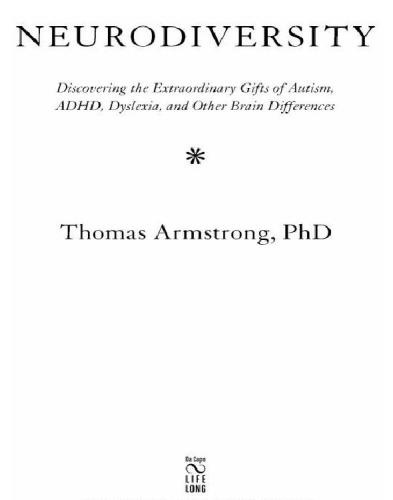
Neurodiversity
Discovering the Extraordinary Gifts of Autism, ADHD, Dyslexia, and Other Brain Differences
کتاب های مرتبط
- اطلاعات
- نقد و بررسی
- دیدگاه کاربران
نقد و بررسی

April 26, 2010
Armstrong (7 Kinds of Smart), an educational consultant turned author, argues that there is no “normal” brain or “normal” mental capability and that we are making a serious mistake in assuming that the kinds of differences we see in people with conditions like autism or dyslexia involve only deficits. People with these conditions also have strengths, he emphasizes, and by focusing on these, rather than on the “labels,” we can find the modes of learning and living that can help them thrive. Focusing primarily on seven “labels” (autism, ADHD, dyslexia, mood disorders, anxiety disorders, intellectual disabilities, and schizophrenia), He offers some good teaching tips. Yet while claiming not to romanticize, say, depression, his conclusions fall too close, as when he writes, “in some mood disorders, there may be a silver lining,” citing how Jung and Beethoven found creativity in the depths of their depression. In equating anecdote with pattern, he strains credibility. Armstrong is strongest in emphasizing that a broader understanding of neurodiversity will generate more respect and better results for people with the conditions he discusses.

August 1, 2010
Armstrong uses the term neurodiversity to encompass a new way of thinking about a variety of disabilities (e.g., autism, attention deficit/hyperactivity disorder, dyslexia) by focusing on their potential benefits rather than problems. For each of these conditions, he provides an overview, examples of complementary careers, and stories of people who exceed expectations. In the section on autism, Armstrong looks at math savants and those with amazing memory to showcase what people can accomplish. While this is useful and uplifting for individuals staring at these lifelong conditions, it might be disingenuous, much like citing basketball great Michael Jordan's being cut from his high school team as an example of overcoming adversity. Just as it is not realistic that everyone cut from a team will be Michael Jordan, not everyone with autism or dyslexia can succeed in his or her chosen field. Examples used are from highly accomplished and highly functioning people with these conditions, so they do not represent realistic paths for many facing more debilitating conditions. VERDICT Despite problems, this is recommended for readers interested in all the facets of these disabilities.--Corey Seeman, Univ. of Michigan Lib., Ann Arbor
Copyright 2010 Library Journal, LLC Used with permission.

























دیدگاه کاربران